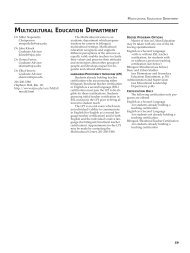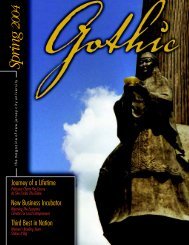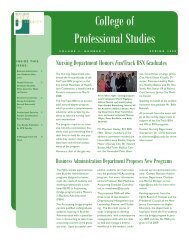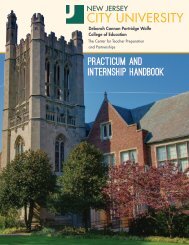Graduate Catalog - New Jersey City University
Graduate Catalog - New Jersey City University
Graduate Catalog - New Jersey City University
You also want an ePaper? Increase the reach of your titles
YUMPU automatically turns print PDFs into web optimized ePapers that Google loves.
44 GRADUATE CATALOG 2013-2016 NEW JERSEY CITY UNIVERSITY<br />
COURSE DESCRIPTIONS<br />
The Department offers three types of<br />
courses. “Professionalized subject matter”<br />
courses generally approach mathematics<br />
in a way that enhances the depth of<br />
understanding and teaching, of mathematics<br />
in the elementary, middle, or secondary<br />
school. “Pure mathematics” courses<br />
encourage the student to strengthen the<br />
knowledge of mathematics with a possible<br />
goal of pursuing an additional advanced<br />
degree. “Computer-related” courses provide<br />
students with a mathematical approach to<br />
computational processes.<br />
MATH 501 Math Content<br />
Praxis Review (1)<br />
This course provides a review of the<br />
mathematical topics tested for secondary<br />
certification.<br />
*No more than three 500-level courses<br />
below can be counted towards the M.A.<br />
in Mathematics Education. (MATH<br />
501 Math Content Praxis Review is not<br />
counted in this total.)<br />
*MATH 503 Computers<br />
in Mathematics (3)<br />
This course provides students, who have<br />
basic computer literacy and some elementary<br />
knowledge of computer programming,<br />
specific skills in using mathematical software.<br />
Problems and projects are taken from<br />
a variety of mathematical subjects including:<br />
pre-calculus, calculus, number theory,<br />
geometry, linear algebra, abstract algebra,<br />
and statistics. Explanations and introductions<br />
to these subjects are provided.<br />
*MATH 508 Professionalized<br />
Subject Matter in Arithmetic (3)<br />
This course offers a study of procedures in<br />
arithmetic. Attention is given to concepts<br />
in manipulative and problem solving areas.<br />
The student is required to show evidence of<br />
the ability to use these concepts and skills in<br />
a classroom.<br />
*MATH 510 Professionalized<br />
Subject Matter in Algebra (3)<br />
This course provides the student with a<br />
reappraisal of the fundamental concepts of<br />
algebra. Emphasis is placed on the manner<br />
in which these concepts can be used to<br />
teach algebra more effectively. The student<br />
is required to show evidence of the ability to<br />
use these concepts and skills in a classroom.<br />
Topics include: number, set, relations, functions,<br />
operation structure, and problem<br />
solving.<br />
*MATH 511 Professionalized Subject<br />
Matter in Middle School Mathematics (3)<br />
This course stresses mathematical concepts<br />
and skills required of children entering the<br />
middle school curriculum in recent years.<br />
The student is required to show evidence of<br />
the ability to use these concepts and skills in<br />
a classroom. Topics include: modular arithmetic,<br />
numeration, geometry, descriptive<br />
statistics, algebra, and mathematical games.<br />
*MATH 512 Professionalized<br />
Subject Matter in Geometry (3)<br />
This course provides a review of fundamental<br />
concepts of geometry and an investigation<br />
of their significance in the teaching of<br />
secondary school mathematics. Concepts<br />
to be analyzed include: logic, proof, and<br />
axiomatic systems; physical and geometric<br />
models; sets, relations, and transformation;<br />
non-metric and metric concepts, and<br />
coordination of spaces. Attention is given<br />
to: historical considerations bearing on the<br />
teaching of geometry; integration of geometry<br />
with algebra and science; and significant<br />
literature on the subject. The student is<br />
required to show evidence of the ability to<br />
use these concepts and skills in a classroom.<br />
*MATH 514 Professionalized Subject<br />
Matter in Pre-calculus Mathematics (3)<br />
This course presents pre-calculus topics,<br />
particularly trigonometry and matrix operations.<br />
Attention is given to historical considerations<br />
and to current trends in teaching<br />
this content. The student is required to<br />
show evidence of the ability to use these<br />
concepts and skills in a classroom.<br />
*MATH 515 Math Manipulatives 1 (3)<br />
This course explores the use of manipulatives<br />
such as geoboards, Cuisenaire rods,<br />
number lines, software and CD ROM<br />
materials in the teaching of mathematics in<br />
elementary and middle schools. Both commercial<br />
and teacher-made manipulatives are<br />
utilized. The student is required to show<br />
evidence of the ability to use these concepts<br />
and skills in a classroom.<br />
*MATH 516 Math Manipulatives 2 (3)<br />
This course continues the exploration of<br />
using manipulatives to teach mathematics.<br />
The student is required to show evidence of<br />
the ability to use these concepts and skills in<br />
a classroom.<br />
*MATH 517 Calculators<br />
in the K-8 Classroom (3)<br />
This course explores the use of calculators<br />
in the teaching of mathematics K-8. Topics<br />
include using calculators to reinforce the<br />
elementary and middle school mathematics<br />
curriculum and constructing student<br />
projects that make use of the calculator.<br />
*MATH 518 Calculators<br />
in the Secondary Classroom (3)<br />
This course explores the use of graphing<br />
calculators in the teaching of secondary<br />
school mathematics. The use of calculators<br />
is demonstrated for algebra, pre-calculus,<br />
geometry, statistics, trigonometry, and<br />
calculus. Student projects are constructed<br />
which make use of the calculator.<br />
*MATH 526 Algorithmic<br />
Number Theory (3)<br />
This course presents number theory from<br />
an historical point of view and emphasizes<br />
significant discoveries from ancient<br />
to modern times, as well as presenting<br />
unsolved problems and areas of current<br />
interest. Topics include: prime numbers and<br />
related theorems; Euclidean algorithm and<br />
quadratic reciprocity; Pythagorean numbers<br />
and continued fractions.<br />
*MATH 531 Numerical Analysis (3)<br />
Topics include iterative methods of solving<br />
equations; interpolation and polynomial approximation;<br />
numerical differentiation and<br />
integration; numerical solution of differential<br />
equations; solution of linear systems<br />
by direct and iterative methods; matrix<br />
inversion and calculation of eigenvalues and<br />
eigenvectors of matrices. Selected algorithms<br />
may be programmed.<br />
*MATH 536 Mathematical Modeling (3)<br />
The main objectives of this course are: to<br />
explore mathematical models of real world<br />
situations, to set up such models, and to<br />
review the mathematics needed to treat such<br />
models. Analysis of computer simulations of<br />
the models plays a major role in this course.<br />
*MATH 540 Graph Theory (3)<br />
Topics studied in this course include paths,<br />
walks, networks, trees, connected graphs,<br />
subgroups and related applications.


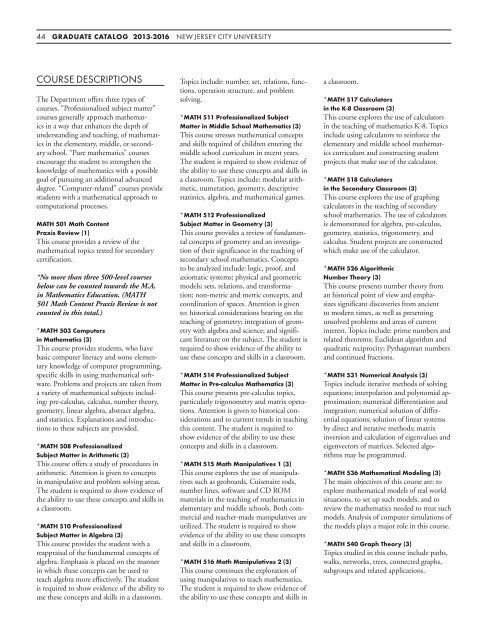
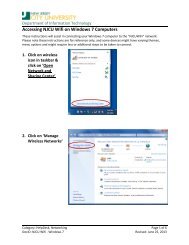
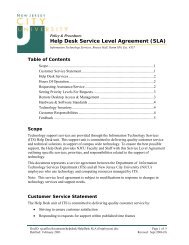

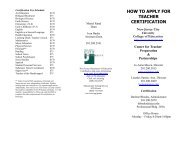
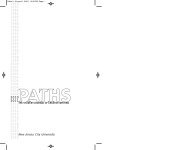
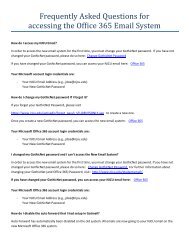
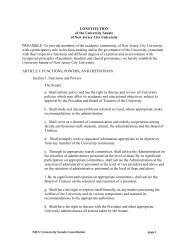
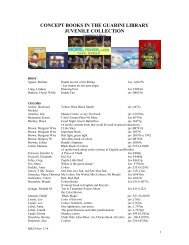
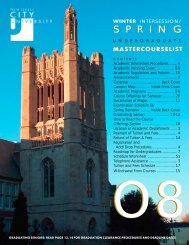
![UACHS 9th English Unit- Feed[1] - New Jersey City University](https://img.yumpu.com/46563190/1/190x245/uachs-9th-english-unit-feed1-new-jersey-city-university.jpg?quality=85)
